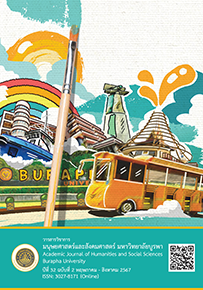Model for Creating Cooperation Community Organizations to Create a Welfare Grassroots Economy System
Main Article Content
Abstract
The objectives of this article were to study the model for creating cooperation community organizations to create a welfare grassroots economy system in Maejo, Sansai district, Chiang Mai; the article was qualitative research, and the instrument used in the research study was a semi-structured interview form and focus group. Key informants were selected from people with knowledge and experience in community organization development. Included representatives of community organizing groups, representatives from government and private agencies, representatives of local leaders, representatives of educational institutions, representatives of religious leaders, and representatives of the public sector, with a total of 60. The obtained data were analyzed using inductive analysis to obtain objective findings.
The study results revealed that the model for creating cooperation among community organizations is to create a welfare grassroots economy system. It was found that there are elements that make a process model for creating cooperation that includes steps for studying communities using spatial pluralism, discussion, and release of statements by community leaders and searching for a reinforcing partner and the process of building a model with details on adjusting thought waves to arouse interest and participation and developing the potential of community organizations through leaders, committees, and members and opening up community thinking space for learning and producing leaders of change.
Downloads
Article Details

This work is licensed under a Creative Commons Attribution-NonCommercial-NoDerivatives 4.0 International License.
บทความทุกบทความเป็นลิขสิทธิ์ของวารสารวิชาการมนุษยศาสตร์และสังคมศาสตร์ มหาวิทยาลัยบูรพาเท่านั้น
References
จินตนา กาศมณี. (2557). การจัดสวัสดิการชุมชนโดยภาคประชาชนในกรุงเทพมหานคร กรณีศึกษาเครือข่ายกองทุนสวัสดิการชุมชน เขตคันนายาว. [ดุษฎีนิพนธ์รัฐประศาสนศาสตรดุษฎีบัณฑิต, มหาวิทยาลัยเกริก].
จินตวีร์ เกษมศุข. (2554). การสื่อสารกับการเปลี่ยนแปลงของสังคม. จุฬาลงกรณ์มหาวิทยาลัย.
ฉัตรทิพย์ นาถสุภา. (2556). อนาคตสังคมไทย: ข้อคิดเพื่อพิจารณา. สำนักงานกองทุนสนับสนุนการวิจัย.
ณัฐนรี ศรีทอง. (2552). การเพิ่มศักยภาพภาวะความเป็นผู้นำในงานพัฒนาชุมชน. โอเดียนสโตร์.
ธรรมพร ตันตรา. (2563). การเสริมแรงผู้นำสตรีในอำเภอสันทราย จังหวัดเชียงใหม่ ในการพัฒนาสังคมชุมชน. [รายงานวิจัย]. วิทยาลัยบริหารศาสตร์ มหาวิทยาลัยแม่โจ้.
นันทิยา หุตานุวัตร และณรงค์ หุตานุวัตร. (2549). การพัฒนาองค์กรชุมชน. เอกซ์เปอร์เน็ท.
ประเวศ วะสี. (2541). ประชาคมตำบล (พิมพ์ครั้งที่ 2). มติชน.
พระมหาสุนิตย์ อาภากโร. (2548). นวัตกรรมการเรียนรู้: คน ชุมชนและการพัฒนา. โครงการสร้างเสริมการเรียนรู้เพื่อชุมชนเป็นสุข.
พรรณทิพย์ เพชรมาก. (2545). สวัสดิการชุมชนแก้จนอย่างยั่งยืน. สถาบันพัฒนาองค์กร ชุมชน (องค์กรมหาชน).
วิชิต นันทสุวรรณ. (2542). ภูมิปัญญาไทยกับการพัฒนา. มหาวิทยาลัยศรีนครินทรวิโรฒประสานมิตร.
สถาบันพัฒนาองค์กรชุมชน. (2559). คู่มือการส่งเสริมการพัฒนาระบบเศรษฐกิจฐานราก. สถาบันพัฒนาองค์กรชุมชน (องค์การมหาชน).
สลิลทิพย์ เชียงทอง และอินทิรา วิทยสมบูรณ์. (2552). คู่มือการดำเนินงานโครงการสนับสนุนการจัดสวัสดิการชุมชน. สถาบันพัฒนาองค์กรชุมชน (องค์การมหาชน).
สมคิด แก้วทิพย์ และเกศสุดา สิทธิสันติกุล. (2562). การศึกษาสถานการณ์ ศักยภาพและข้อจำกัดในการพัฒนาเศรษฐกิจฐานราก: กรณีศึกษาภาคเหนือ. [รายงานวิจัย]. สำนักงานกองทุนสนับสนุนการวิจัย (สกว.) ฝ่ายวิจัยเพื่อท้องถิ่น.
สมพันธ์ เตชะอธิก และคณะ. (2549). การเรียนรู้และการจัดการความรู้ขององค์กรชุมชนเพื่อชุมชนเป็นสุข: รายงานการสังเคราะห์การวิจัย. ภาควิชาสังคม คณะมนุษยศาสตร์และสังคมศาสตร์ มหาวิทยาลัยขอนแก่น.
อรรถพร สิงหวิชัย. (2557). เศรษฐกิจฐานรากกับความมั่นคงของชาติ. [รายงานวิจัย]. วิทยาลัยป้องกันราชอาณาจักร.
Cohen, J., & Uphoff, N. (1977). Rural development participation: Concept and measures for project design implementation and evaluation. Rural Development Center Cornell University.
Erwin, W. (1976). Participation management: Concept theory and implementation. Georgia State University.


